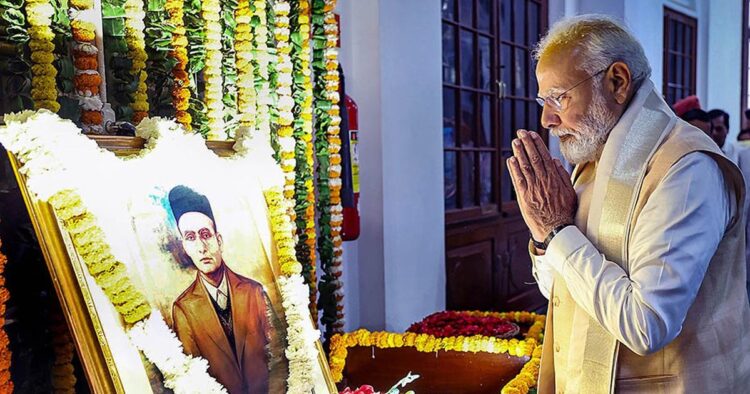Veer Savarkar’s life took a dramatic turn in 1910 when he was arrested by the British.
Vinayak Damodar Savarkar, popularly known as Veer Savarkar, was a prominent leader in India’s independence movement. His life was marked by relentless struggle, deep patriotism, and an unshakable commitment to freeing India from British rule.
His transformation from a young scholar to a fearless revolutionary is an inspiring and fascinating story.
Early Life and Revolutionary Awakening
Born on May 28, 1883, in Bhagur village of Maharashtra’s Nashik district, Savarkar grew up in a prosperous Brahmin family. His father, Damodar Pant Savarkar, was a teacher and social reformer, which exposed young Savarkar to progressive ideas early on.
After completing his education in Nashik, he moved to Victoria College in Mumbai, where he was introduced to nationalist ideas. During this time, he met influential leaders who made him aware of British atrocities and the urgent need for India’s independence.
Savarkar’s revolutionary ideas began to take shape when he joined the All-India Hindu Mahasabha and developed a deep understanding of nationalism. In 1905, he moved to England to study law at the University of London. While in England, he actively engaged with freedom fighters and wrote extensively on India’s struggle for independence.
His most notable work, The History of the First War of Indian Independence, described the 1857 revolt as India’s first war for freedom. However, due to its revolutionary content, the British banned the book.
Imprisonment and Struggles in Cellular Jail
Savarkar’s life took a dramatic turn in 1910 when he was arrested by the British. According to a report by Aaj Tak, he was accused of involvement in the assassination of Nashik’s Collector, Jackson.
The incident occurred when 18-year-old revolutionary Anant Laxman Kanhere shot Jackson at a farewell event in Nashik. It is believed that the pistol used in the attack was sent by Savarkar. He was charged with inciting Jackson’s murder and conspiring against the British Crown. However, there was no direct evidence linking him to the assassination.
A British court sentenced Savarkar to two life imprisonments, totaling 50 years. In 1911, at the age of 28, he was sent to the infamous Cellular Jail in the Andaman Islands. Despite enduring extreme hardships, he remained mentally strong, continuing his writings and dedication to India’s freedom struggle.
Legacy and Influence on Indian Nationalism
Savarkar was released in 1924 under strict conditions but continued his nationalist work. He remained actively engaged in social and cultural reforms, emphasizing Hindutva as a unifying ideology for India. His legacy continues to influence Hindu nationalism, with many of his ideas gaining prominence in modern Indian politics.
On his death anniversary, Prime Minister Narendra Modi paid tribute, stating, “His invaluable sacrifice, courage, and struggle in the independence movement can never be forgotten by the grateful nation.” Savarkar’s unwavering commitment to India’s freedom struggle remains an enduring part of the country’s history.

















Comments